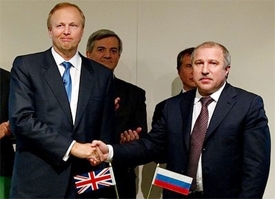BP, Rosneft announce share swap, Arctic exploration deal
 In what BP chief executive Bob Dudley said was a "historic" deal, the firms will explore and develop Rosneft's three licensed blocks on the Russian Arctic continental shelf for what are expected to be major reserves of oil and gas.
In what BP chief executive Bob Dudley said was a "historic" deal, the firms will explore and develop Rosneft's three licensed blocks on the Russian Arctic continental shelf for what are expected to be major reserves of oil and gas.
The deal puts BP - still recovering from the Gulf of Mexico oil spill last year, which is set to cost the firm $40 billion - at the forefront of the race to exploit the potentially huge energy reserves in the Arctic.
"Following completion of this agreement, Rosneft will hold five percent of BP’s ordinary voting shares in exchange for approximately 9.5 per cent of Rosneft’s shares," the new partners said in a joint statement.
The shares issued by BP are worth approximately $7.8 billion and Rosneft's will be similar, the firms said.
Dudley and Rosneft President Eduard Khudainatov signed the deal at a press conference in London, shortly after Russian Prime Minister Vladimir Putin announced the agreement in Moscow.
Khudainatov said the areas that BP and Rosneft would be working in, which cover 125,000 square kilometres in an area of the South Kara Sea, contained five billion tonnes of oil and 3,000 billion cubic metres of gas.
BP currently has a three percent stake in Rosneft, and Russia accounts for around one quarter of the British energy giant's total production.
BP also owns 50 per cent of Russia's third biggest oil producer, TNK-BP, where Dudley served as chief executive for five years until he was expelled by BP's Russian partners during a shareholder dispute in 2008.
Putin met Dudley in Moscow earlier Friday, telling him, according to Russian news agencies: "The Russian government is going to support your joint work."
British Energy Secretary Chris Huhne also welcomed the "groundbreaking deal", saying it was "good news for Europe, for the UK, energy security and worldwide" - and showed that BP was "very much open for business".
In New York, BP's US shares gained 3.6 per cent to $49.25 on the announcement.
Speaking at the press conference, Dudley said: "I do believe this is a historic moment for BP, for our industry and I believe for Russia and the wider world of energy globally."
Khudainatov added: "This project is unique in its complexity and scale both for Russia and the global oil and gas industry."
However, the agreement is likely to anger environmentalists who have warned that such exploration could damage the fragile Arctic ecosystem.
BP has endured a torrid time following last year's oil spill in the Gulf of Mexico, and it is currently in the process of selling $30 billion worth of assets to cover its part of the bill for the disaster.
The spill could cost BP $40 billion, the firm has said, and has left its reputation in the United States in tatters.
However, BP also reported a net profit of $1.785 billion for the third quarter of 2010 - a huge turnaround following a loss of $16.9 billion during the second quarter.
Analyst Justin Urquhart Stewart, co-founder of Seven Investment Management, said the tie-up with Rosneft would leave BP well placed to capitalise on Russian oil interests, but risked upsetting US investors.
"In terms of BP, it gives them fantastic access to the large oil fields in the Arctic," he said, adding: "But it will put the company in a difficult position in America, they won't like it becoming a quasi-Russian company."
In Washington, Democratic congressman Edward Markey, who sits on a committee on natural resources, called for the deal to be examined to see how it affects BP's US operations and if it had national security implications.
"BP once stood for British Petroleum. With this deal, it now stands for Bolshoi Petroleum," he said.
What the stars mean:
★ Poor ★ ★ Promising ★★★ Good ★★★★ Very good ★★★★★ Exceptional
Related Contents
Latest News
More News
- Hermes joins Long Thanh cargo terminal development (February 04, 2026 | 15:59)
- SCG enhances production and distribution in Vietnam (February 04, 2026 | 08:00)
- UNIVACCO strengthens Asia expansion with Vietnam facility (February 03, 2026 | 08:00)
- Cai Mep Ha Port project wins approval with $1.95bn investment (February 02, 2026 | 16:17)
- Repositioning Vietnam in Asia’s manufacturing race (February 02, 2026 | 16:00)
- Manufacturing growth remains solid in early 2026 (February 02, 2026 | 15:28)
- Navigating venture capital trends across the continent (February 02, 2026 | 14:00)
- Motivations to achieve high growth (February 02, 2026 | 11:00)
- Capacity and regulations among British areas of expertise in IFCs (February 02, 2026 | 09:09)
- Transition underway in German investment across Vietnam (February 02, 2026 | 08:00)

 Tag:
Tag:




















 Mobile Version
Mobile Version